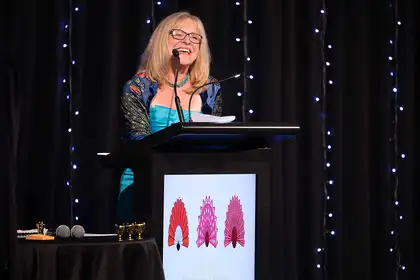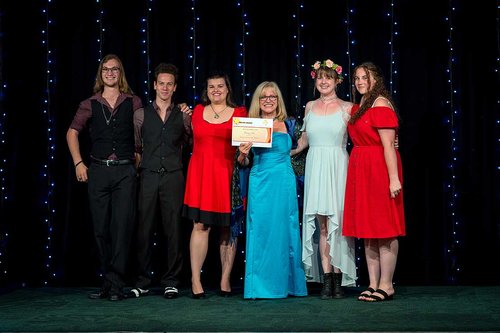
Professor Angie Farrow speaking at the Manawatū Regional Theatre Awards after receiving her Lifetime Achievement Award.
Great theatre can change minds and lives, says Professor Angie Farrow, who credits her childhood amid the lively antics of her extended family in London’s East End with shaping her dramatic sensibilities.
Farrow, a professor in theatre at Massey, an internationally award-winning playwright and a community arts initiator, recently received the prestigious Lifetime Achievement in Theatre Award at the Manawatū Regional Theatre Awards. It’s the latest in a gamut of prizes she has received over her career, in recognition of her outstanding creative output on topics as diverse as love, death, refugees, the plight of the Manawatū river and Kafka, as well as her commitment to community theatre and her skill and passion in teaching theatre.
A dramaturg and executive producer of numerous community theatre events, including the biennial Manawatū Festival of New Arts, the Manawatū Street Theatre Project and the annual Manawatū Summer Shakespeare, she has won national and international awards for her plays, including The Pen is a Mighty Sword International Playwriting Competition in the US for Despatch in 2007 and Best Drama Script at the Auckland Short and Sweet Festival for Leo Rising in 2014. In 2011 she was awarded for her ‘Outstanding Contribution to New Zealand Drama’ by the Playwrights’ Association of New Zealand.
But, after 23 years at the Manawatū campus as a pioneer in the expressive arts and theatre studies programmes in the School of English and Media Studies, and having recently been promoted to a professor, she is about to exit stage left and down the stairs of the elegantly refurbished Sir Geoffrey Peren Building to Wellington, to embrace a new phase of her life.
Professor Farrow discovered her interest in theatre at age 16, although the seeds were there all along, she suspects. “I grew up in a multi-storey house in the East End of London that was full to the brim with my extended family – my nan and granddad, aunts, uncles, cousins, brothers, sisters. There were plenty of dramas – fighting, cursing, arguing, celebrating, laughing, partying, which I must have absorbed unconsciously!”
When a brilliant ‘alternative’ drama teacher started teaching in her neighbourhood she went along with a friend who was “too scared to go on her own”.
The teacher introduced them to devised theatre, improvisation and dance drama. “It was like a foreign language to me, but I really took to it. In particular, it gave me a sense of power and, for the first time in my life, I understood how exhilarating it could be to make something from nothing.”
However, her “obsession” with theatre began when she discovered playwriting in her early 20s. “Writing my first play was a pivotal experience because I realised there were worlds and powerful voices inside me that I never knew were there,” says Professor Farrow, who has published five volumes of her short plays for stage and radio.
Theatre is a like a drug
Theatre has always been like a drug, she says. “Most of us who are involved in it see it as an addiction.” And while the process of creating theatre can be exhausting to the point of wanting to give it up at times, she invariably returns to it. “I do believe that theatre can change lives – I’ve seen it first-hand hundreds of times. People discover that they are so much more than they imagined. They find deep friendships, they sharpen their sense of integrity; they become politicised; they learn how to express themselves fully through voice, mind and body; they learn about discipline; and how to meet deadlines.”

Professor Angie Farrow (blue dress) with Massey students Cameron Dickons, Kaitlin Edmonds, Jess Ramage, Sarah Angland and Zak Rodgers - all from Firing Line.
Political focus
Other accolades include first prize at The Inspirato International Playwriting Contest in Toronto in 2013 for her short play The Blue Balloon, a magical, existential 10-minute play and an example of the power of short plays, or what she calls “haiku theatre where you say big things in small spaces”.
She believes that theatre can be a powerful agent of change for audiences when it addresses political issues without being preachy. “We live in a time when global issues can penetrate every aspect of our lives – we know about the famine in Yemen, the bush fires in Australia, the threat of climate change. Done well, theatre is capable of synthesising these ‘big picture’ realities into narratives that audiences are able to absorb without being overwhelmed.”
Receiving the lifetime award has, she says, humbled, honoured and delighted her. “Theatre is one of the best forms I know to cultivate and enhance community and because it gives me great joy to see people working harmoniously together and with a common purpose.” Over two decades, it also represents the “hundreds of people who have contributed to my experience, my success,”she says.
Teaching is her first love (in 2010 she won a $20,000 national tertiary teaching excellence award), and it is the students she will miss. “Theatre is an intellectually rigorous form, whether students are studying or writing plays or whether they are exploring a character as an actor. All of the courses we teach at Massey attempt to use critical and creative learning and it’s the combination that provides depth and rigour.”
The award has also helped her to focus on what happens next. She hopes to continue her playwriting as well complete an anthology of stories based on growing up in the East End. Mainly, she wants to make space for new things to happen, but right now she isn’t quite sure what those new things might be.
“Massey has been very good to me and has offered a place of discovery, stimulation and support, I will miss being around so many great colleagues and amazing students, but it really does feel time to open a new chapter.”
This year, Massey Community Theatre – made up of students and staff from the University’s varied drama programmes – swept up five awards in all. Firing Line, a piece of street theatre devised, written and performed by Creativity In The Community's class of 2018, took out both the Best Ensemble and Best Original Script and Production awards. The show’s technical support team, comprised of Luke Anderson, Leith Haarlhoff, Sean Monaghan and composer/Massey artist-in-residence David Downes won the Technical Design and Operation award for their multimedia spectacle, and School of English and Media Studies staff member and technician Luke Anderson won the Gordon Alve Memorial Award in Technical Excellence.